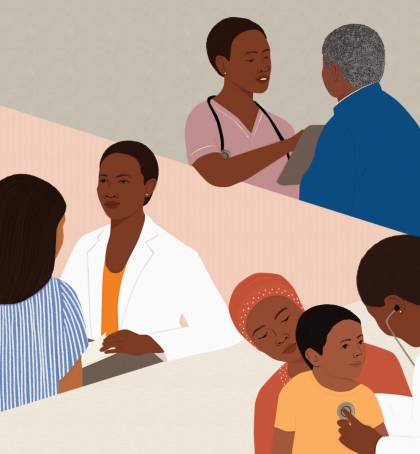As a physician, my familiarity with illness and death is humbling. I know all too well the anguish felt by my patients and their families. The deaths of two beloved family members left me with deep scars, forever changing the course of my life. In time, I have learned to turn my pain into purpose, using encounters with death as my muse to help others achieve better outcomes and live longer and healthier lives through vital preventive care.

Image credit: illustration by Ojima Abalaka
I lost my brother a day before my 23rd birthday. He was 26 years old and my best friend. An autopsy showed that he had dilated cardiomyopathy and left ventricular hypertrophy. A simple preventive test, such as an ECG or ECHO, could have potentially saved his life. Thirteen years later to the day, I lost my father to stage 3 T-cell lymphoma. He was the love of my life.
While the lymphoma itself was not preventable, we could have found out earlier if he'd had his preventive screenings routinely. So my sojourn into public health was not an accident. Even before experiencing these aching losses, I had an up-close and personal relationship to illness. I was a sickly child and all too familiar with doctors and the hospital. By the time I was 10, I was sure that I wanted to be a physician, and nothing was going to change that.
In medical school, I spent a lot of my time volunteering and working in surrounding and rural communities, organizing free medical checkups, caring for people living with AIDS, and counseling adolescents on sexual and reproductive health and much more.
Following my graduation and during my internship in Nigeria, I realized the cycle of ignorance, poverty, and disease ran deep. I decided to search for more knowledge to enable me to impact more lives, which led me to Johns Hopkins 13 years ago. Hopkins gave me the knowledge, exposure, and sense of community I needed to empower others on their journeys to better health.
In 2014, my husband Olalekan Adeyemi, Bus '12 (MBA), and I launched Magna Carta Health, a preventive health services organization with the mission of preventing death, disability, and disease in Nigeria, where we have roots. There is also a high burden of preventable disease and that's where these services are needed the most. Magna Carta Health is currently serving 15,000 patients a year and counting. We are bridging health care gaps and increasing access to health care with the aid of technology; for example, we built an app that helps doctors better serve communities by increasing access to care.
While I could not save the lives of my family and friends that I have lost, I know I can still save many others.
Posted in Alumni
Tagged public health, alumni







